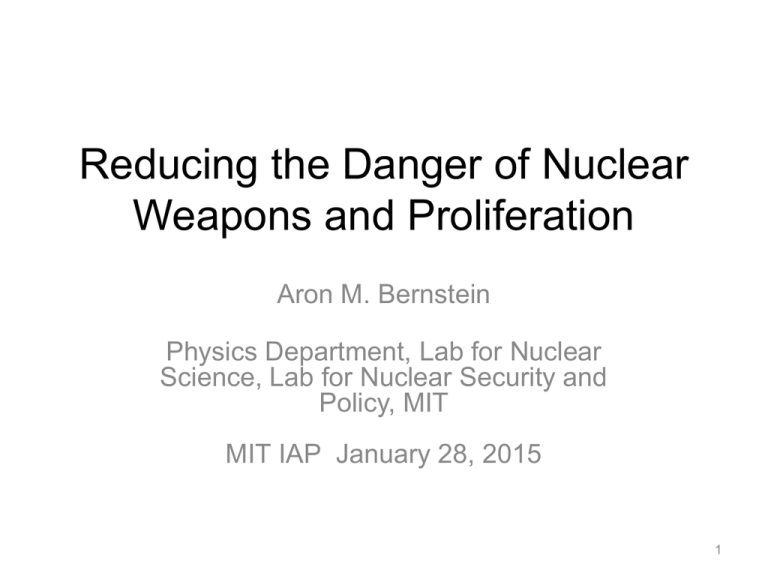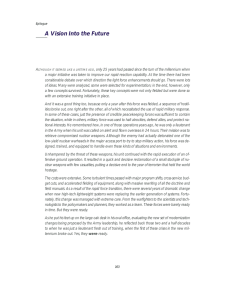
Reducing the Danger of Nuclear
Weapons and Proliferation
Aron M. Bernstein
Physics Department, Lab for Nuclear Science, Lab for Nuclear Security and
Policy, MIT MIT IAP January 28, 2015
1
Talk Overview
•
•
•
•
•
Possible paths to nuclear war?
Proliferation, NPT
Nuclear weapons abolition?
Obama’s record
Outlook
2
Utility of Nuclear Weapons
Pro
• Ended war in
Japan
• Saved casualties
in WW2
• Prevented WW3
between US &
USSR
Con
• Not necessary;
were the first step
in the cold war
• Needlessly killed
Japanese civilians
• European war was
not likely without
nuclear weapons
3
Nuclear Weapons Questions
• No nuclear war since 1945 – deterrence, nuclear taboo, luck, or other reasons? • Does the possession of nuclear weapons
make a country more secure?
• Is the present situation stable?
• Is the era of arms control and gradual reduction of nuclear weapons over?
• Should we try to abolish nuclear weapons?
– Is it possible?
4
Scientists React to the Bomb
• Lab discussions organized
– Chicago: Spring 1945
– Use bomb for demonstration, not on cities
– Share secret of the bomb
• No secret, no monopoly, no defense, international control
required
– One World or None
• 1945: Bulletin of the Atomic Scientists, Federation of
American Scientists
– Civilian control of atomic energy
• Acheson-Lilienthal plan (Oppenheimer): March 1946
• Baruch plan
– UN, failure to get agreement
– collapsed by early 1947
5
Expectations about the Bomb:
1945
• Atomic Scientists (Oppenheimer, Bohr,
Frank, Szilard)
– It would be so terrifying that a war could be
ended but they warned that its use could lead
to a nuclear arms race and Armageddon
• Politicians (Churchill, Roosevelt)
– It would become a powerful influence
6
Expectations about the Bomb:
1945
• Atomic Scientists (Oppenheimer, Bohr, Frank, Szilard)
– It would be so terrifying that a war could be ended but they
warned that its use could lead to a nuclear arms race and
Armageddon
• Politicians (Churchill, Roosevelt)
– It would become a powerful influence
Neither was fully correct
• Its coercive influence has been small
• Possession became a status symbol before NPT
• Deterrence, abhorrence non-use (nuclear taboo)
7
Cold War
Courtesy of User: Fastfission on Wikipedia. Image is in the public domain.
8
Elwood H. Smith cartoon about the nuclear arms race has been removed due to copyright restrictions.
9
Trident II Submarines
• 24 D5 missiles: ~ 4 warheads
• Warheads: W76 (100 kT), W88 (300 kT)
•
•
•
•
•
•
– (Hiroshima: ~15 kT)
Each sub has ~24x4 = 96 warheads
Could destroy that many targets
Delivery time: 15-30 minutes
Total explosive power > 10 MT
Total allied bombing in WWII: ~3 MT
US has 14 subs, England has 4 (~1/2 at sea)
10
© Arms Control Today. All rights reserved. This content is excluded from our Creative
Commons license. For more information, see http://ocw.mit.edu/help/faq fair-use/.
11
Pathways to Nuclear Escalation
• Vulnerability: nuclear weapons + missiles
• Fear
• Reliance on deterrence (how much is
enough?)
12
Possible Pathways to War
• Errors/accidents, aggressive deployment
[launch on warning] accidental launch
• Escalation from conventional war
– Aggressive deployment (India/Pakistan?)
• Rogue commanders/insider theft
• Theft/sale of fissile material terrorist
bomb
13
The Cold War Legacy
“The President of the United States now for 50 years is
followed at all times, 24 hours a day, by a military aide
carrying a football that contains the nuclear codes that
he would use and be authorized to use in the event of a
nuclear attack on the United States. He could launch a
kind of devastating attack the world’s never seen. He
doesn’t have to check with anybody. He doesn’t have to
call the Congress. He doesn’t have to check with the
courts. He has that authority because of the nature of the
world we live in.”
Vice President Richard Cheney
14
Launch on Warning: Accidental
Nuclear War?
•
•
•
•
•
•
•
•
US and Russia have ~1000 missiles on alert status
Delivery times: ~15/30 minutes, SLBM/ICBM based
Decision times: ~10 minutes
Probability of error non-negligible (complex systems)
Each side vulnerable to the other’s system
Russian system less robust
Each side does it because the other does
Jan. 2013: Defense Science Board warned that our
command and control system’s vulnerability to
cyber attack had not been fully assessed
15
Nuclear Non-Proliferation Treaty (NPT), 1970
• Limits the spread of nuclear weapons
• Currently 189 countries
–5 with nuclear weapons: US, Russia, UK, France, and
China
• Israel, India, Pakistan, and North Korea (withdrew
2003) are not parties to the treaty
• Cornerstones
1. Non-proliferation
2. Disarmament: Article VI obligates the nuclear
weapons states to work on eliminating their nuclear
arsenals
3. Right to peacefully use nuclear technology
4. Reviewed each five years at UN; May 2015
16
1974 NPT treaty effectiveness?
• 5 nuclear powers committed to disarmament (no schedule): US,
Russia, UK, France, China
• 4 nuclear states outside the treaty: Israel (1967), India (1974),
Pakistan (1990), North Korea (2006)
• A.Q. Khan Network, Pakistan (now shut down)
• Worries about Iran
• 2 countries have given up bombs (South Africa & Libya)
• Many countries have given up programs: Taiwan, Sweden, Brazil,
Australia, Argentina…
• Nuclear capable countries have no weapons: Japan, South Korea,
Germany, Canada…
• Fewer countries have bombs than predicted: JFK worried (in 1963)
that 15 to 25 would have them
• Political norm is to renounce nuclear weapons and press the haves
to disarm!
17
NPT Problems
• North Korea
–
–
–
–
–
1985: signs NPT, resists IAEA inspections
1994-2002: freeze activities, “Agreed Framework”
2006: Test 1, ~0.5 kT
2009, 2013: Tests 2 and 3, few to 10 kT
All tests measured by CBTBO
• Iran: signed NPT
– Enriched activities, problems with IAEA UN
resolutions, sanctions
– 2013: “First Phase Agreement” & freeze
– Tough negotiations under way
– Hard liners in Iran, US pose threat (Menendez-Kirk)
18
Stormy Weather Predicted:
5-Year NPT Review, UN, May 2015
• Successful 2010 Nuclear Nonproliferation
Treaty (NPT) Review Conference
• Follow-through on 22 interrelated
disarmament step consensus action plan
has been very disappointing
• December 2014, Daryl Kimball ACA
19
A Nuclear Free World?
Obama’s Prague Speech, April 5, 2009
• I state clearly and with conviction America’s
commitment to seek the peace and security of a
world without nuclear weapons.
• This goal will not be reached quickly – perhaps not
in my lifetime. It will take patience and persistence.
But we must ignore the voices who tell us that the
world cannot change.
• As long as these weapons exist, the US will
maintain a safe, secure, and effective arsenal to
deter any adversary, and guarantee that defense
to our allies.
20
Arguments Against Nuclear Weapons Abolition Dangerous: eliminates deterrence
Suggests weakness
Will not deter Iran, North Korea, …
Imposes impossible inspection
requirements
• Cannot be achieved
• Nuclear weapons cannot be un-invented
•
•
•
•
21
Deterrence
• Preventing a direct attack on a nuclear armed power
– This has worked, or at least it never has happened
• Coercive diplomacy [changing unwanted actions]
•
•
•
•
•
– This has almost never worked: Russian takeover of Eastern
Europe, Korean War, Chinese bomb…
Enables brinkmanship: Pakistan/India, Berlin crisis
Requires showing “resolve” (crisis instability)
Requires rational and accurate decision makers
Does not work against an accidental use
Unlikely to work against terrorists
Deterrence requires small numbers of weapons – more
leads to instability (could cause war)
22
Should We Try to Abolish Nuclear Weapons?
• There is no risk free world!
• The present situation is not stable: we
could be lucky for a long time, but we can’t
be sure
• Fewer nuclear weapons increase safety
• Abolition is a goal worth working towards,
even if we don’t get there. We have
committed ourselves in Article VI of the
NPT!
23
Obama’s Record
•
•
•
•
•
•
Raised hopes in Prague speech
New Start Treaty
Improved Nuclear Security (Summits)
Trying to engage Russia in further steps (difficult)
Nuclear posture review – only slightly modified
~1000 nuclear weapons still on launch on warning
(US, Russia)
• North Korea: strategic patience (i.e., neglect the
issue)
• Modernizing nuclear weapons, delivery systems
24
Some Reasons for Optimism
• No nuclear war since 1945
– Deterrence, nuclear taboo, luck
• NPT working reasonably well
• CTBO in operation: detected ~0.5 kT North
Korean test
• Budget constraints in Russia and US may lead to
nuclear force reductions
• World wide discussion of zero nuclear weapons
• Look for fireworks at UN May 2015 NPT review
• Public opinion counts!
25
Arms Control Organizations
•
Council for a Livable World
•
The Arms Control Organization (ACA)
•
•
Federation of American Scientists (FAS)
Peace Action: Grassroots peace network
– Nuclear physicist Leo Szilard founded Council for a Livable World in 1962 to deliver
“the sweet voice of reason” about nuclear weapons to Congress, the White House,
and the American public.
– A Washington, DC based non-profit, non-partisan advocacy organization dedicated to
reducing the danger of nuclear weapons and increasing national security. Our mission
is to advocate for sensible national security policies and to help elect congressional
candidates who support them.
– Founded in 1971, is a national nonpartisan membership organization dedicated to
promoting public understanding of and support for effective arms control policies.
Through its public education and media programs and its magazine, Arms Control
Today (ACT), ACA provides policy makers, the press, and the interested public with
authoritative information, analysis, and commentary on arms control proposals,
negotiations and agreements, and related national security issues.
26
Nuclear Weapons Questions
• No nuclear war since 1945 – deterrence, nuclear
taboo, luck, or other reasons? [all]
• Does the possession of nuclear weapons make a
country more secure? [probably not]
• Is the present situation stable? [with luck]
• Is the era of arms control and gradual reduction of nuclear weapons over? [next few years bleak]
• Should we abolish nuclear weapons [we should
try] and is it possible? [even less likely]
27
Conclusions: Plenty of Work to do
to Reduce the Danger of Nuclear War
• Deal constructively with Iran and North Korea
• Take weapons off hair-trigger alert
• Russia: resolve ballistic missile defense issue, reduce
weapons to ~1000 including tactical, reduce stockpile
• Bring other nuclear powers into discussion
•
•
•
•
•
•
–Include India, Pakistan, and Israel
Secure nuclear material
Fissile material cutoff treaty
Stockpile stewardship program (maintain, not modernize)
Use budget constraints to improve nuclear weapons policy
Speed elimination of retired nuclear weapons
Pass the CTBT in the US Senate
28
MIT OpenCourseWare
http://ocw.mit.edu
RES.8-004 Reducing the Danger of Nuclear Weapons and Proliferation
January IAP 2015
For information about citing these materials or our Terms of Use, visit: http://ocw.mit.edu/terms.






